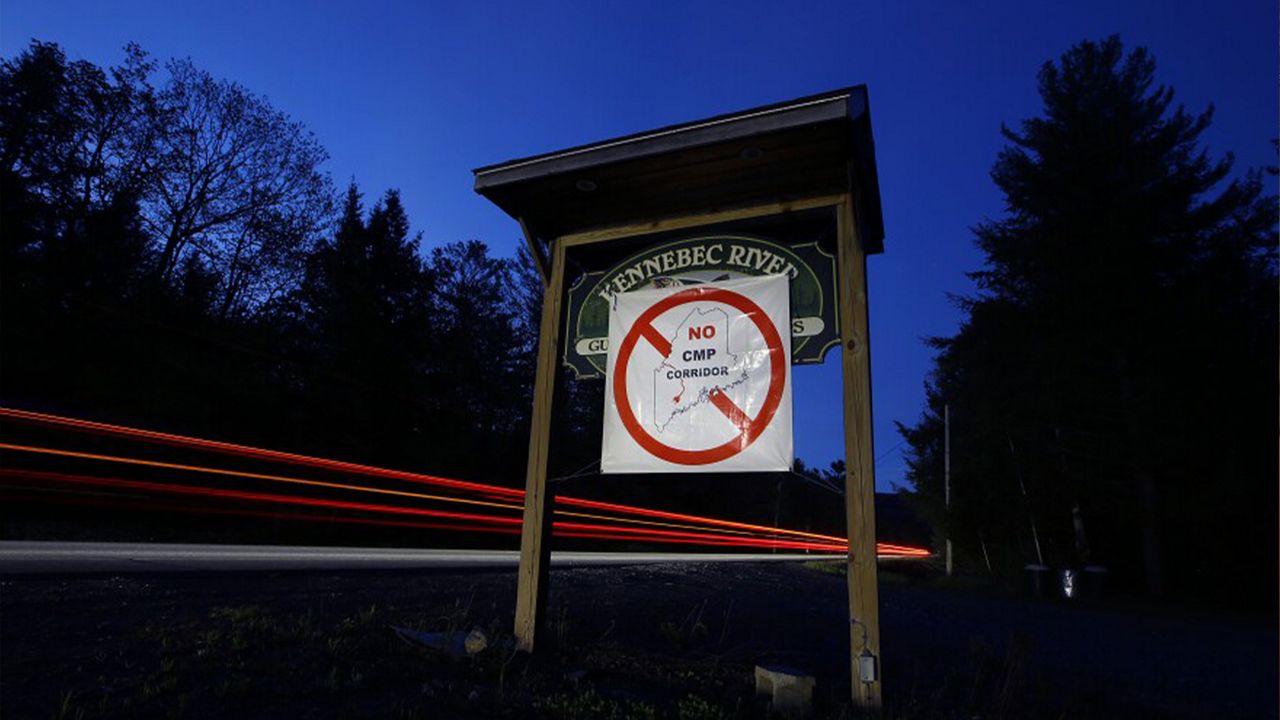Maine voters have approved a ballot initiative to retroactively block the controversial Central Maine Power transmission corridor project, dealing a potential death blow to the latest efforts to bring an influx of Canadian hydropower onto the New England grid.
The “yes” side of the referendum was declared the winner with just under 60% percent of the vote and more than half of Maine precincts reporting just before 10 p.m. Tuesday, capping the most expensive referendum campaign in state history.
The Natural Resources Council of Maine was a leading opponent of the corridor and supporter of the referendum, along with groups like the Sierra Club and fossil fuel-fired power plant owners like NextEra, which would compete with the CMP project on the region’s energy market.
The nonprofit NRCM said in a statement soon after the race was called that the referendum’s outcome was a decisive call for CMP to “terminate” work on the power line.
“If CMP fails to halt construction activities right away, then the Department of Environmental Protection should move quickly to suspend the permit and require that CMP begin restoring areas of Western Maine that already have been damaged,” NRCM advocacy director Pete Didsheim said in the release.
The outcome is expected to lead to swift litigation that could come from either side, adding to the pile of court and regulatory challenges the project already faces. A statement Tuesday night from CMP’s pro-corridor political action committee, Clean Energy Matters, signaled the legal battle to come.
"We believe this referendum, funded by fossil fuel interests, is unconstitutional,” the PAC’s statement said. “With over 400 Maine jobs and our ability to meet our climate goals on the line, this fight will continue."
The developer successfully fought off a previously proposed anti-corridor referendum with a similar argument in 2020.
Still, the result marks a huge and costly rebuke to the already embattled CMP, the transmission line’s power supplier Hydro-Quebec, and the state of Massachusetts, which hopes to count the electricity toward its climate change goals.
Didsheim, with NRCM, said in his statement that Massachusetts should “honor” the referendum vote “by selecting an alternative option for meeting its climate goals without imposing significant environmental harm on another New England state.”
The success of the ballot initiative marks the second time that a Northern New England state has moved at the eleventh hour to block a Canadian hydro-powered transmission line tapped to help meet the Southern New England state’s ambitious climate change goals.
The CMP corridor’s predecessor in that vein was Eversource’s Northern Pass proposal, which would have run through the White Mountains. New Hampshire regulators denied the project final permission to build in early 2018, and rejected the developer’s request for a rehearing.
Days after the New Hampshire Supreme Court unanimously affirmed the project’s denial, Eversource notified its shareholders that the power line would not move forward.
The CMP corridor could now face a similar path if it tries to fight the ballot referendum’s success in court. If the initiative stands, though, it will close the Upper Kennebec region to this kind of project entirely — essentially precluding even a different version of the corridor plan from moving forward and sending Massachusetts and Hydro-Quebec back to square one yet again.
The “yes” vote also has broader implications for the ease of building similar transmission lines in Maine in the future. The full proposal that voters approved Tuesday not only bans high-voltage transmission projects from the Upper Kennebec region entirely, but also requires two-thirds legislative approval for any such project anywhere else in the state going forward.
This kind of new infrastructure will likely be a key ingredient in the Northeast’s push to fight climate change — by expanding the use of renewable energy sources like wind and solar and by electrifying Maine’s top sources of fossil fuel emissions: transportation and home heating.
These climate implications have recently come into focus for Question 1’s opponents, including the Biden administration. Energy Secretary Jennifer Granholm posted a series of tweets urging a “no” vote on the referendum last week.
Maine Gov. Janet Mills, a Democrat who supports the corridor, said in her latest weekly radio address that she’s “no fan of CMP,” but warned that the referendum could “send a chilling message ... to others, including renewable energy companies, that they might have to have the rug pulled out from under them long after they’ve invested and played by the rules and gotten approvals, because of some change in the political winds.”
The referendum vote likely puts the onus back on state regulators to decide the controversial corridor’s fate. Updates are expected in the coming days.





